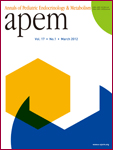
JOURNAL OF PEDIATRIC ENDOCRINOLOGY & METABOLISM
Scope & Guideline
Exploring Breakthroughs in Endocrinology and Metabolism
Introduction
Aims and Scopes
- Pediatric Endocrinology:
The journal covers a wide range of topics in pediatric endocrinology, including hormone disorders, growth abnormalities, and puberty-related conditions. It emphasizes the importance of understanding the unique endocrine needs of children and adolescents. - Metabolic Disorders:
Research on metabolic disorders, such as obesity, diabetes, and inborn errors of metabolism, is a core focus. The journal highlights studies that explore the pathophysiology, diagnosis, and treatment of these conditions in the pediatric population. - Genetic and Molecular Studies:
The journal publishes studies that examine the genetic and molecular basis of endocrine and metabolic diseases, including genetic mutations and their clinical implications. This includes case reports and cohort studies that advance the understanding of hereditary conditions. - Clinical Management and Treatment Approaches:
There is a consistent emphasis on clinical management strategies, treatment outcomes, and best practices for pediatric patients with endocrine and metabolic disorders. The journal aims to disseminate knowledge that enhances clinical care. - Longitudinal and Retrospective Studies:
The journal frequently features longitudinal studies and retrospective analyses that provide insights into the progression and long-term outcomes of various endocrine and metabolic disorders in children.
Trending and Emerging
- Impact of COVID-19 on Pediatric Endocrinology:
Several studies are exploring the effects of the COVID-19 pandemic on the incidence and management of pediatric endocrine disorders, such as type 1 diabetes. This includes investigations into changes in presentation, metabolic control, and access to care. - Psychosocial Aspects of Endocrine Disorders:
There is an increasing focus on the psychosocial impact of endocrine and metabolic disorders on children and their families. Research is addressing mental health issues, quality of life, and the emotional well-being of patients with chronic conditions. - Advanced Genetic and Genomic Research:
The journal is seeing a rise in studies utilizing advanced genetic and genomic techniques to understand the etiology of endocrine disorders. This includes whole-exome sequencing and genetic screening that provide insights into hereditary conditions. - Multidisciplinary Approaches to Treatment:
Emerging themes include collaborative and multidisciplinary approaches to treatment, emphasizing the importance of integrating pediatric endocrinology with other specialties such as nutrition, psychology, and genetics. - Long-term Outcomes and Follow-up Studies:
There is a growing trend toward long-term follow-up studies that assess the outcomes of pediatric patients with endocrine disorders into adulthood, highlighting the importance of lifelong management and monitoring.
Declining or Waning
- Traditional Nutritional Studies:
There seems to be a waning interest in traditional nutritional studies related to pediatric endocrinology. As newer methodologies and technologies emerge, research has shifted towards more complex metabolic and genetic studies. - Single Condition Focus:
Research focusing solely on individual endocrine conditions is becoming less prevalent. There is a trend towards integrated studies that encompass multiple endocrine and metabolic disorders, reflecting a more holistic approach to patient care. - Generalized Growth and Development Studies:
Studies that broadly address growth and development without specific endocrine or metabolic implications are appearing less frequently. The focus has shifted to more targeted research that aligns with clinical relevance and precision medicine.
Similar Journals

Turkish Journal of Endocrinology and Metabolism
Pioneering Open Access Discoveries in Metabolism and EndocrinologyThe Turkish Journal of Endocrinology and Metabolism, published by AVES, is a prominent platform dedicated to advancing research in the fields of endocrinology, diabetes, and metabolism. As an Open Access journal since 2002, it provides unrestricted access to its content, fostering a global exchange of knowledge among researchers, clinicians, and students. Operating from Turkey, this journal plays a crucial role in disseminating innovative findings related to endocrine disorders and metabolic diseases. While its current Q4 quartile rankings in both Endocrinology and Internal Medicine underscore areas for growth, they also signify the journal’s commitment to enhancing its impact within these disciplines. The journal emphasizes the development of locally relevant research while encouraging international contributions, thus bridging gaps in global health discourse. Engage with cutting-edge research that shapes clinical practices and informs public health policies by submitting your work or exploring the journal’s vast archive from 2009 to 2023.

Journal of Endocrinology and Metabolism
Advancing knowledge in endocrine health and metabolic science.Journal of Endocrinology and Metabolism is a dynamic and essential publication in the field of endocrinology, diabetes, and metabolism, published by ELMER PRESS INC in Canada. With an ISSN of 1923-2861 and E-ISSN 1923-287X, this journal serves as a pivotal platform for sharing innovative research and advancements from 2018 through 2024. Although categorized in the fourth quartile (Q4) for 2023, its commitment to high-quality research is reflected in its ongoing efforts to foster scholarly dialogue and illuminate critical issues within its scope. Targeting primarily researchers, healthcare professionals, and students, the journal aims to disseminate crucial findings that advance our understanding of endocrine functions and metabolic processes. Given its Scopus ranking of #207 out of 244 within its category, the Journal of Endocrinology and Metabolism continues to contribute to the global discourse on these vital health topics.

HORMONE AND METABOLIC RESEARCH
Advancing Knowledge in Endocrinology and BiochemistryHORMONE AND METABOLIC RESEARCH, published by GEORG THIEME VERLAG KG, stands as a reputable platform in the fields of biochemistry, endocrinology, and metabolism since its establishment in 1969. This peer-reviewed journal provides critical insights and advancements in the intricate relationships between hormones and metabolic processes, catering to researchers, healthcare professionals, and students alike. With an impressive convergence of knowledge spanning over five decades, it maintains a commendable Q3 ranking in multiple categories, including Biochemistry, Clinical Biochemistry, and Endocrinology, highlighting its contribution to cutting-edge scientific discourse. Although not an open-access journal, it offers a plethora of access options for readers and institutions, ensuring that vital research reaches those who need it most. Located in Stuttgart, Germany, the journal is positioned at the forefront of influential research in hormone and metabolic studies, emphasizing its importance for ongoing investigations into health and disease.

Frontiers in Endocrinology
Unlocking the Secrets of Hormonal ScienceFrontiers in Endocrinology, published by FRONTIERS MEDIA SA, is a leading open-access journal dedicated to the advancement of research in the fields of endocrinology, diabetes, and metabolism. Established in 2010, this journal has consistently demonstrated its academic excellence, achieving a prominent Q1 quartile ranking in its category as of 2023, and a commendable Scopus rank of #96 out of 244, placing it within the 60th percentile. The journal is committed to disseminating high-quality research that encompasses a wide range of topics within endocrinology, catering to the needs of a diverse audience that includes researchers, medical professionals, and students alike. With the critical goal of fostering knowledge-sharing and collaboration within the scientific community, Frontiers in Endocrinology is an invaluable resource for anyone looking to stay updated on the latest advancements and insights in endocrinology. It operates under a robust open-access model, ensuring that groundbreaking research is accessible to all, thereby driving innovation and progress in this essential field.

Therapeutic Advances in Endocrinology and Metabolism
Fostering collaboration for groundbreaking endocrine research.Therapeutic Advances in Endocrinology and Metabolism is a premier open-access journal published by SAGE Publications Ltd that has established itself as a leading platform for research in the field of endocrinology, diabetes, and metabolism. With a commitment to disseminating high-quality research, the journal aims to advance our understanding of therapeutic interventions and innovations in the management of endocrine disorders. Since its inception in 2010, it has garnered a strong reputation, attaining a Q1 quartile ranking in 2023 in its category and boasting a respectable Scopus rank of #53 out of 244, positioning it within the 78th percentile. As an open-access journal since 2019, Therapeutic Advances in Endocrinology and Metabolism ensures that valuable research findings are accessible to a global audience, fostering collaboration and knowledge sharing among researchers, clinicians, and students alike. The journal's multifaceted objectives encompass the publication of original research, reviews, and clinical studies that contribute to the evolving dialogue surrounding endocrine health. By delivering timely and robust content, it serves as an indispensable resource for those striving to make significant contributions to this vital area of medical science.

ENDOCRINE RESEARCH
Pioneering discoveries in endocrine health.ENDOCRINE RESEARCH is a prominent peer-reviewed journal published by TAYLOR & FRANCIS INC, focused on the dynamic field of endocrinology. With an ISSN of 0743-5800 and an E-ISSN of 1532-4206, this journal has been contributing to the scientific community since 1974, providing a platform for researchers to disseminate innovative findings related to hormonal research and its implications in diverse medical contexts. Operating from the United States, it falls within the Q3 quartile ranking in both Endocrinology and Medicine (Miscellaneous), reflecting its recognized impact within these disciplines. While ENDOCRINE RESEARCH currently does not offer open access options, it remains an invaluable resource for professionals, students, and researchers seeking to stay at the forefront of endocrine science and clinical application. The journal invites original research articles, reviews, and case studies, fostering a collaborative environment for discussing the complexities of endocrinological phenomena.

Annals of Pediatric Endocrinology & Metabolism
Advancing knowledge in pediatric endocrinology and metabolism.Annals of Pediatric Endocrinology & Metabolism, published by the Korean Society of Pediatric Endocrinology, is a vital resource for researchers, healthcare professionals, and students in the fields of endocrinology, diabetes, and pediatric health. With its commitment to open access since 2012, the journal facilitates the dissemination of groundbreaking research on pediatric endocrine disorders and metabolic diseases, ensuring that vital knowledge is accessible to a global audience. The journal maintains a reputable standing with a 2023 Scopus rank of #92 in Pediatrics and a Q3 quartile in Endocrinology, highlighting its impact on the field. Originating from South Korea, the journal fosters a collaborative network of researchers and advocates best practices in pediatric care through interdisciplinary studies. The Annals not only enhances scientific understanding but also emphasizes practical applications aimed at improving child health outcomes, making it an essential publication for academics and practitioners alike.

ENDOCRINE JOURNAL
Connecting professionals through pioneering endocrinology research.ENDOCRINE JOURNAL, published by the Japan Endocrine Society, is a pivotal resource for researchers and professionals in the field of endocrinology, diabetes, and metabolism. With a long history dating back to 1954, this journal encompasses a comprehensive range of topics including hormonal regulation, pathophysiology of endocrine diseases, and innovative therapeutic approaches. Despite its classification as open access, the journal remains a beacon of knowledge, with impressive rankings—Q2 in Endocrinology, Diabetes and Metabolism and Q3 in Endocrinology for 2023—ensuring it is a respected source in the academic community. It serves as a critical platform for the dissemination of cutting-edge research, encouraging collaboration and facilitating advancements in understanding complex endocrine disorders. By subscribing to this journal, researchers and students gain access to seminal studies, clinical insights, and a wealth of information that drives this vital field forward.

Journal of Clinical Research in Pediatric Endocrinology
Transforming clinical research into real-world solutions.Journal of Clinical Research in Pediatric Endocrinology is a premier open-access journal dedicated to advancing the field of pediatric endocrinology through rigorous research and innovative findings. Published by GALENOS PUBL HOUSE, this journal has established itself as a key resource since its inception in 2008, serving a broad audience of researchers, healthcare professionals, and students in the fields of endocrinology, pediatrics, and child health. With an impact factor reflecting its significance (currently ranked in the Q2 and Q3 quartiles across multiple relevant categories), it provides a platform for high-quality peer-reviewed articles that encompass clinical observations, experimental studies, and reviews. The journal operates under an open-access model, ensuring that findings are accessible to a global audience, fostering collaborative solutions for the challenges in pediatric endocrine disorders. Residing in Turkey, the journal continues to impact the scientific community by disseminating valuable research that promotes better understanding and treatment of hormonal and metabolic disorders in children.

Hormones-International Journal of Endocrinology and Metabolism
Connecting Scholars in the Realm of Hormonal StudiesHormones - International Journal of Endocrinology and Metabolism, published by Springer International Publishing AG, is a vital resource within the field of Endocrinology, Diabetes, and Metabolism. Since its inception in 2005, this journal has made significant contributions to the understanding of hormonal mechanisms and their implications across various medical disciplines. With a current impact factor that places it in the Q3 category for Endocrinology and the Q2 category for miscellaneous Medicine – as indicated by its Scopus rankings – it stands out as a reputable platform for cutting-edge research and clinical findings. Although it operates under a subscription model, the journal's comprehensive scope encompasses basic and applied scientific studies, making it essential reading for researchers, clinicians, and students alike. The journal is headquartered in Germany with a strong commitment to promoting scholarly communication and knowledge dissemination within its specialized fields through the year 2024 and beyond.